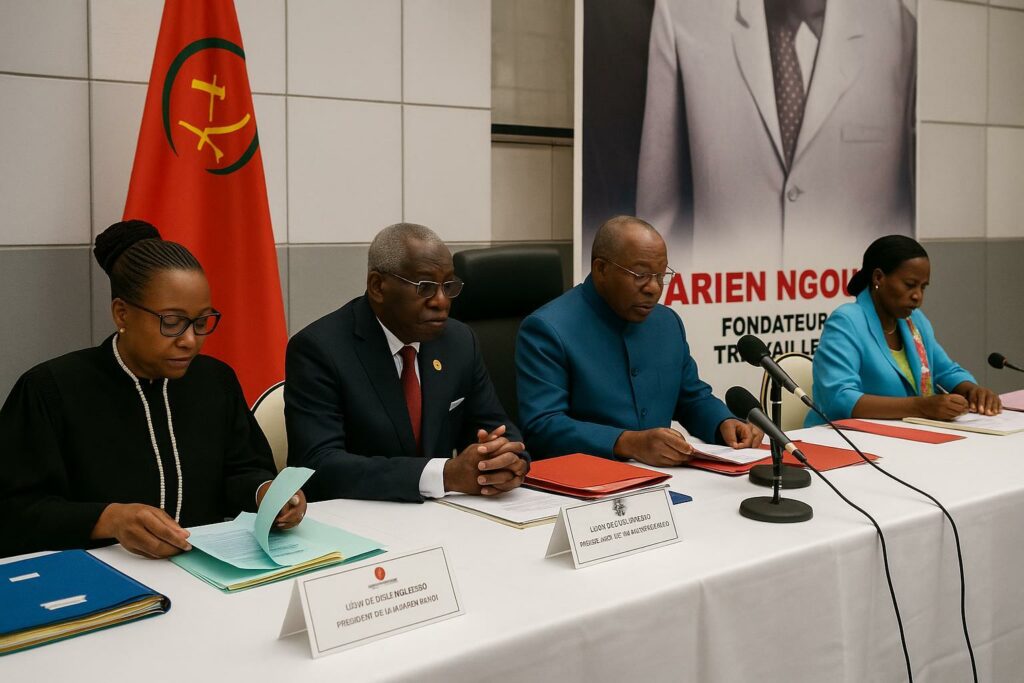A decisive organisational milestone for the ruling party
The Congolese Party of Labour (PCT) has moved one step closer to its sixth ordinary congress, scheduled for December, by formally adopting the reports submitted by its seven thematic commissions. Meeting on 24 October under the chairmanship of the preparatory committee’s president, Pierre Moussa, the delegates endorsed documents that encapsulate weeks of consultations, listening sessions and internal debate. The party leadership portrays the exercise as both a test of collective discipline and a demonstration of its capacity to recalibrate in response to evolving national and international dynamics.
Seven thematic commissions, one strategic blueprint
The adopted texts cover a broad spectrum of governance and policy concerns. The political commission has refined the party’s vision of national governance, while the economic and financial doctrine commission has revisited development priorities in light of new fiscal realities. Institutional and organisational reform proposals aim to streamline internal procedures, whereas the social and cultural commission elaborates a platform intended to resonate with diverse social strata. Complementing these domains, specialised working groups on unions and associative movements, communication, and environmental sustainability attempt to weave societal dialogue, narrative cohesion and ecological responsibility into the party’s agenda. The resulting blueprint aspires to offer militants a comprehensive, mutually reinforcing set of objectives.
Pierre Moussa’s call for responsibility and fairness
Opening the 24 October meeting, Pierre Moussa praised the rigour and dedication of commission members, calling the reports “the fruit of several weeks of work, listening and analysis”. For the veteran statesman, their adoption constitutes “a moment important for the collective consolidation of orientations that will nourish the sixth congress”. He urged delegates to maintain “an esprit of responsibility and justice”, underscoring that the proposed conclusions must meet the expectations of both congress and grassroots militants. Moussa’s tone combined caution with confidence: by welcoming constructive scrutiny yet insisting on unity of purpose, he reaffirmed the PCT’s tradition of disciplined deliberation.
Technical committees: the invisible architecture of the congress
Behind the headline commissions, seven technical committees are quietly shaping the congress’s logistical and procedural infrastructure. Teams dedicated to logistics, finances, protocol, transportation and accommodation, as well as health and security, work in tandem to ensure that the December gathering unfolds smoothly. A committee on the investiture of congress delegates is tasked with validating credentials, a procedural safeguard intended to preserve the integrity of deliberations. Together, these bodies form an intricate support system that mirrors the thematic commissions’ intellectual labour in the practical domain.
Key takeaways for militants and observers
The sequence of internal validations demonstrates the PCT’s preference for methodical preparation prior to public deliberation. By finalising the thematic texts well ahead of December, the preparatory committee signals organisational stability and ideological clarity. For party militants, the reports offer an updated compass; for external observers, they provide a window onto the party’s evolving stance on economic management, environmental stewardship and social cohesion.
Legal and economic reflections
From a legal standpoint, the adoption reinforces internal compliance with the PCT’s statutes, which require that congress documentation be circulated and approved before formal debate. Economically, the new doctrine report is expected to inform the party’s position on budgetary priorities and resource allocation, although the specifics will only become public once congress debates are under way. By synchronising legal procedure with policy intent, the party underscores its commitment to disciplined governance and fiscal prudence.
Looking ahead to December
With the thematic and technical groundwork now consolidated, preparations enter their final phase. Accreditation of delegates, final adjustments to logistical arrangements and dissemination of key documents are expected to intensify in the weeks leading up to the congress. Party cadres view December not merely as a routine gathering but as an opportunity to articulate an updated roadmap that aligns longstanding ideological pillars with contemporary challenges.

